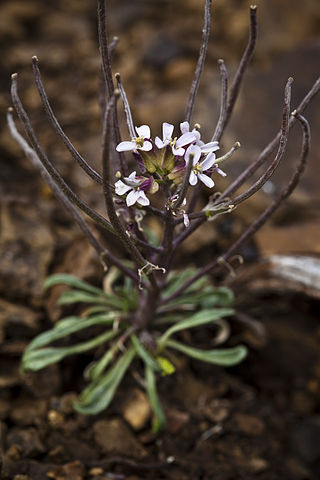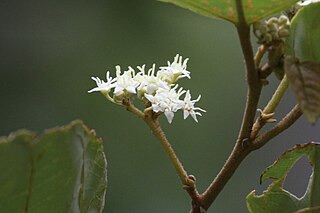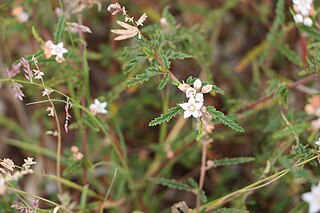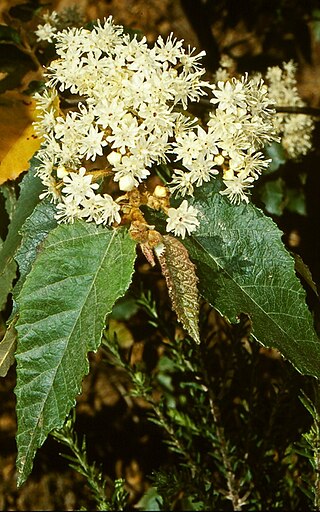
Fontainea is a genus constituting part of the plant family Euphorbiaceae. The nine currently known species grow naturally in Queensland (Qld) and New South Wales (NSW) Australia, New Caledonia and Vanuatu, and Papua New Guinea. Some species are commonly named blushwood.

Commersonia is a genus of twenty-five species of flowering plants in the family Malvaceae. Plants in this genus are shrubs or trees, occurring from Indochina to Australia and have stems, leaves and flowers covered with star-like hairs. The leaves are simple, often with irregularly-toothed edges, the flowers bisexual with five sepals, five petals and five stamens and the fruit a capsule with five valves. The genus underwent a revision in 2011 and some species were separated from Commersonia, others were added from Rulingia.
Multidentia is a genus of flowering plants in the family Rubiaceae.

Erysimum redowskii, synonym Erysimum pallasii, known as Pallas' wallflower, is a low shrub or mid shrub species from the Arctic. It has purple flowers that do not reflect UV.
Orestias is a genus of orchids. It has 4 known species, all native to central Africa, including the island of São Tomé in the Gulf of Guinea.
- Orestias elegansRidl. - São Tomé, Príncipe
- Orestias foliosaSummerh. in G.M.D.Troupin - Gabon, Zaire
- Orestias micranthaSummerh. - São Tomé, Cameroon, Equatorial Guinea
- Orestias stelidostachya(Rchb.f.) Summerh. - São Tomé
Alexander Gilli was an Austrian botanist and pteridologist. He was a pioneer in research on plant communities.
Schistopterini is a tribe of tephritid or fruit flies in the family Tephritidae.

Commersonia macrostipulata is a species of flowering plant in the family Malvaceae and is endemic to Queensland. It is a shrub or tree with egg-shaped leaves that are slightly serrated on the edges, flowers with five cream-coloured to white sepals and bristly fruit.

Commersonia obliqua is a species of flowering plant in the family Malvaceae and is endemic to Vanuatu. It is a shrub or tree with lance-shaped leaves and white flowers.

Androcalva argentea is a species of flowering plant in the family Malvaceae and is endemic to Queensland. It is a tall shrub that forms suckers from rhizomes and has silvery branchlets and leaves, the leaves egg-shaped with wavy edges and serrated, and dense clusters of 10 to 30 white to cream-coloured flowers.

Androcalva beeronensis is a species of flowering plant in the family Malvaceae and is endemic to Queensland. It is a shrub that forms suckers from rhizomes and has branchlets and leaves covered with soft, golden hairs, the leaves egg-shaped to lance-shaped with toothed edges, and clusters of 9 to 24 cream-coloured to white flowers.

Androcalva inglewoodensis is a species of flowering plant in the family Malvaceae and is endemic to south-eastern Queensland. It is a spreading, prostrate shrub that has hairy young branchlets, egg-shaped to elliptic leaves with irregularly serrated edges, and small groups of white to cream-coloured flowers.

Androcalva johnsonii is a species of flowering plant in the family Malvaceae and is endemic to central Queensland. It is a low, spreading shrub that has hairy young branches, narrowly egg-shaped or oblong leaves with rounded teeth, and small groups of white to pale pink flowers.

Androcalva leiperi, also known as Leiper's commersonia, is a species of flowering plant in the family Malvaceae and is endemic to a restricted part of south-east Queensland. It is an erect or prostrate shrub that has brown bark, lance-shaped leaves with 4 to 7 pairs of rounded serrations on the edges, and groups of 3 to 12 white flowers.

Androcalva pearnii is a species of flowering plant in the family Malvaceae and is endemic to the Blackdown Tableland National Park in eastern Queensland. It is shrub that forms suckers and has hairy new growth, wavy, oblong to elliptic leaves with rounded lobes on the edges, and groups of 3 to 8 white and cream-coloured to pale green flowers.

Androcalva pedleyi is a species of flowering plant in the family Malvaceae and is endemic to south-eastern Queensland. It is low, spreading or prostrate shrub that forms suckers and has softly-hairy new growth, linear to lance-shaped leaves with lobes on the edges, and groups of 7 to 10 white, later pink flowers.
Androcalva perkinsiana, commonly known as headland commersonia, is a species of flowering plant in the family Malvaceae and is endemic to a restricted part of central eastern Queensland. It is a small, erect shrub with hairy young branchlets, oblong or lance-shaped leaves with 5 to 11 pairs of small serrations on the edges, and groups of 3 to 4 pale purple flowers.

Androcalva reticulata is a species of flowering plant in the family Malvaceae and is endemic to north-eastern Queensland. It is a low shrub that forms suckers, its new growth covered with star-shaped hairs, and has egg-shaped leaves with irregular teeth on the edges, and groups of two to six red flowers.

Androcalva rossii, commonly known as native hemp, is a species of flowering plant in the family Malvaceae and is endemic to south-eastern Australia. It is spindly shrub or small tree that forms suckers, its branchlets covered with star-shaped hairs, and has egg-shaped leaves with irregular teeth on the edges, and groups of 18 to 60 white or cream-coloured flowers.

Androcalva viscidula is a species of flowering plant in the family Malvaceae and is endemic to eastern Australia. It is a spreading shrub that forms suckers, its new stems densely hairy, and has egg-shaped leaves, sometimes with irregular teeth on the edges, and groups of 22 to 28 white flowers.















